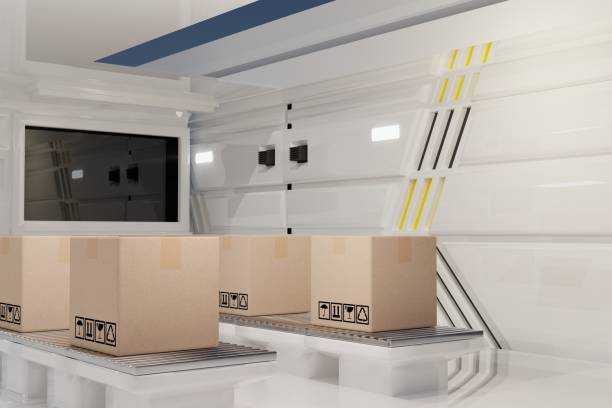Modern Storage and Distribution: Essential Business Solutions
Warehouse services have become essential for businesses looking to streamline their operations and maintain competitive advantage in today's fast-paced market. From storing inventory to managing complex distribution networks, these services provide the infrastructure companies need to meet customer demands efficiently. Understanding the full scope of warehouse services can help businesses make informed decisions about their logistics and supply chain strategies.

Modern warehouse services extend far beyond simple storage, offering integrated solutions that support every aspect of supply chain management. Companies across industries rely on these facilities to handle inventory, process orders, and coordinate shipments with precision. Whether you’re a small e-commerce startup or an established manufacturer, selecting the right warehouse partner can significantly impact your operational efficiency and bottom line.
What Makes Comprehensive Storage Options Essential?
Comprehensive storage options address the diverse needs of businesses handling various product types, volumes, and turnover rates. These solutions include climate-controlled environments for temperature-sensitive goods, secure areas for high-value items, and flexible space arrangements that adapt to seasonal demand fluctuations. Modern warehouses utilize vertical storage systems, automated retrieval technologies, and inventory management software to maximize space utilization while maintaining easy access to products. Businesses benefit from scalable storage that grows with their needs, eliminating the costly commitment of owning dedicated facilities. Additionally, specialized storage solutions accommodate unique requirements such as hazardous materials handling, pharmaceutical-grade environments, and food-safe zones that comply with regulatory standards.
How Can You Enhance Distribution Solutions?
Enhancing distribution solutions involves implementing strategies and technologies that accelerate product movement from warehouse to customer. Advanced warehouse management systems track inventory in real-time, enabling accurate order fulfillment and reducing errors that lead to costly returns. Cross-docking operations minimize storage time by transferring incoming shipments directly to outbound transportation, cutting handling costs and delivery times. Strategic warehouse locations near major transportation hubs and customer concentrations reduce shipping distances and expenses. Many modern facilities offer value-added services including kitting, assembly, labeling, and customized packaging that prepare products for immediate sale. Integration with multiple carriers provides shipping flexibility and rate optimization, while sophisticated routing algorithms ensure packages take the most efficient paths to their destinations.
What Does It Mean to Optimize Supply Chain Logistics?
Optimizing supply chain logistics means creating seamless coordination between procurement, storage, and distribution to minimize costs while maximizing service levels. This process begins with demand forecasting that aligns inventory levels with anticipated sales, preventing both stockouts and excess inventory that ties up capital. Warehouse location strategy plays a crucial role, with businesses choosing between centralized distribution centers that consolidate inventory or regional facilities that enable faster delivery to specific markets. Technology integration connects warehouse operations with transportation management, order processing, and customer relationship systems to create visibility across the entire supply chain. Performance metrics such as order accuracy rates, inventory turnover, and fulfillment speed provide insights for continuous improvement. Collaborative relationships with logistics providers enable businesses to leverage expertise and infrastructure without major capital investments.
Understanding Storage and Distribution Service Costs
Warehouse service pricing varies significantly based on location, services required, and contract terms. Businesses typically encounter several cost components when engaging warehouse providers. Storage fees may be charged per pallet position, square footage, or cubic volume, with rates ranging from $5 to $15 per pallet per month in standard facilities, while climate-controlled or specialized storage can cost $15 to $30 or more. Handling fees for receiving and shipping typically range from $3 to $8 per pallet, with additional charges for order picking, packing, and special handling requirements. Many providers offer bundled services with volume discounts for long-term contracts.
| Service Type | Typical Cost Range | Common Providers |
|---|---|---|
| Standard Pallet Storage | $5-$15 per pallet/month | Regional 3PL companies, national logistics firms |
| Climate-Controlled Storage | $15-$30 per pallet/month | Specialized warehousing providers |
| Order Fulfillment | $3-$8 per order | E-commerce fulfillment centers, 3PL providers |
| Cross-Docking Services | $50-$200 per truck | Transportation-focused logistics companies |
| Value-Added Services | Variable rates | Full-service 3PL providers |
Prices, rates, or cost estimates mentioned in this article are based on the latest available information but may change over time. Independent research is advised before making financial decisions.
Selecting the Right Storage Partner
Choosing an appropriate warehouse service provider requires careful evaluation of multiple factors beyond cost alone. Location accessibility affects both inbound and outbound transportation expenses, making proximity to suppliers and customers an important consideration. Technology capabilities determine how effectively the provider can integrate with your existing systems and provide real-time visibility into inventory and orders. Scalability ensures the provider can accommodate business growth and seasonal fluctuations without service disruptions. Industry experience and specialized certifications matter particularly for businesses with regulatory requirements or unique product handling needs. References from current clients offer valuable insights into service reliability, communication quality, and problem-solving capabilities. Contract flexibility allows businesses to adjust service levels as needs evolve without excessive penalties.
Future Trends in Storage and Distribution
The warehouse industry continues evolving with technological advances and changing customer expectations. Automation through robotics and artificial intelligence improves efficiency while addressing labor challenges in many markets. Sustainability initiatives drive adoption of energy-efficient facilities, electric vehicles, and waste reduction programs that appeal to environmentally conscious consumers. Same-day and next-day delivery expectations push warehouses closer to urban centers, creating demand for smaller, strategically located facilities. Data analytics provide increasingly sophisticated insights into demand patterns, enabling proactive inventory positioning and exception management. The integration of warehouse services with broader supply chain ecosystems creates seamless experiences where products flow efficiently from manufacturer to end customer with minimal friction.
Storage and distribution services represent a critical component of modern business operations, offering solutions that enhance efficiency, reduce costs, and improve customer satisfaction. By understanding the full range of available services and carefully evaluating providers based on specific business needs, companies can build logistics partnerships that support long-term growth and competitive advantage.



